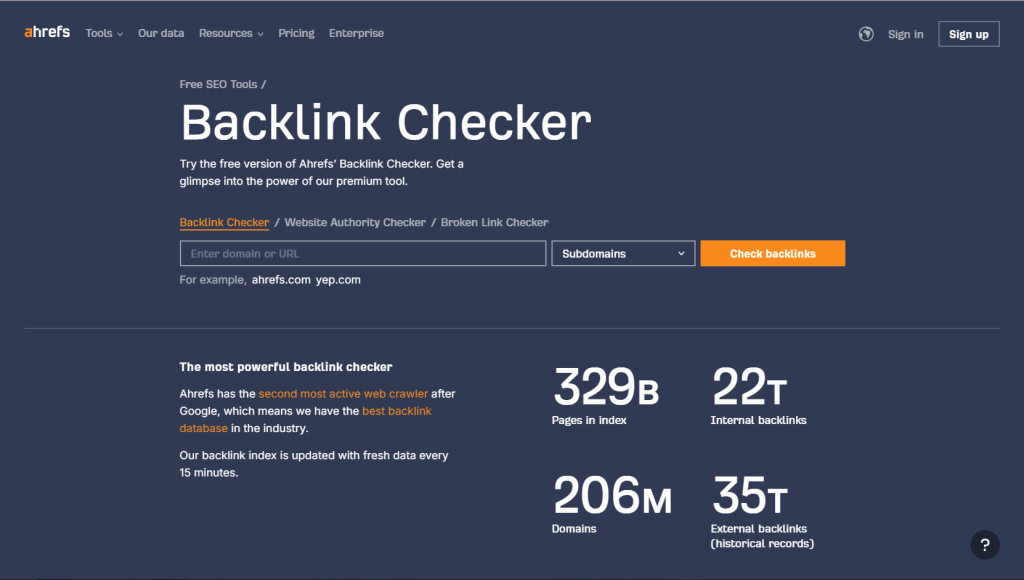The realm of digital marketing is fiercely competitive, and achieving a prominent position in search engine results pages (SERPs) is paramount for attracting organic traffic and propelling your website towards success. When it comes to SEO (Search Engine Optimization), visions of intricate tools and hefty expenses often come to mind. However, the reality is far more empowering – a treasure trove of potent SEO tools exists entirely free of charge. These “small SEO tools” can be game-changers for businesses and individuals alike, enabling website optimization without breaking the bank.
This comprehensive guide dives deep into the world of small SEO tools, exploring their benefits, functionalities, and how they empower you to elevate your website’s search engine visibility. We’ll delve into popular categories, unveil noteworthy tools within each, and equip you with valuable strategies to leverage these free resources for maximum impact.
Table of Contents
The Power of Small SEO Tools
Free SEO tools offer a multitude of advantages, making them particularly valuable for those starting their SEO journey or operating with limited budgets. Here’s a closer look at why they deserve a prominent place in your SEO arsenal:
Accessibility
Free tools eliminate the financial barrier, making SEO accessible to everyone, regardless of budget constraints. This democratizes the online landscape and empowers individuals and small businesses to compete more effectively.
Ease of Use
Many small SEO tools boast user-friendly interfaces and intuitive features. This makes them perfect for beginners or those without extensive technical knowledge. You don’t need to be an SEO expert to get started and reap the benefits.
Quick Wins
Unlike complex, long-term strategies, these tools provide actionable insights and tasks that can be readily implemented, leading to faster SEO improvements. You can see tangible results within a shorter timeframe, keeping you motivated and engaged in the optimization process.
Data-Driven Decisions
Free SEO tools equip you with valuable data to inform your content creation, keyword strategy, and overall SEO approach. This data empowers you to make informed decisions based on real user behavior and search engine trends.
Complementary Power
When combined with other SEO efforts, small tools act as valuable power-ups, boosting your website’s search engine visibility and driving organic traffic. They complement your broader SEO strategy and amplify its effectiveness.
A Comprehensive Look at Popular Small SEO Tools
A diverse range of free SEO tools caters to various aspects of website optimization. Let’s explore some of the most popular categories and highlight noteworthy tools within each:
Keyword Research Tools:
Google Keyword Planner (Freemium)
While not entirely free (requires a Google Ads account), this tool offers a wealth of valuable keyword suggestions and search volume data. This helps you identify relevant keywords with high search volume and low competition, allowing you to target the right audience and improve ranking potential.
Answer the Public

This free tool leverages Google Suggest data to uncover questions people are asking related to your chosen topic. It presents these questions in a visually appealing format, helping you create content that addresses user search intent directly and provides the information users are actively seeking.
Keywordtool.io (Freemium)
This tool provides keyword suggestions based on long-tail searches and search intent. Its free plan offers a good starting point for basic research. You can discover long-tail keyword variations with lower competition, allowing you to target more specific user searches and enhance your content’s relevance.
On-Page Optimization Tools:
Yoast SEO (WordPress Plugin)
This popular plugin for WordPress websites is a must-have for on-page optimization. It offers a comprehensive suite of features, including suggestions for optimizing title tags, meta descriptions, internal linking, and readability. Yoast SEO guides you through the process, making on-page optimization simple and effective.
SEOptimer
Analyze your website’s on-page SEO elements with this free tool. It offers suggestions for improving title tags, meta descriptions, header tags, image alt text, and other crucial on-page factors. By addressing these areas, you can improve the clarity and relevance of your website content for both search engines and users.
PageSpeed Insights (by Google)
Test your website’s loading speed and receive actionable recommendations for improvement with this vital tool. Faster loading times are a crucial ranking factor in today’s fast-paced online environment. PageSpeed Insights helps you identify performance bottlenecks and optimize your website to deliver a seamless user experience, which can positively impact search engine rankings.
Technical SEO Tools:
Google Search Console
This free tool by Google provides invaluable insights into your website’s technical health. It identifies crawl errors, broken links, mobile usability issues, and other technical problems that can hinder SEO performance. By addressing these issues with the help of Search Console, you can improve the crawlability and indexability of your website
Robots.txt Tester (by Google)
Verify whether your robots.txt file is configured correctly to prevent search engines from crawling unwanted pages on your website. A properly configured robots.txt file ensures search engines prioritize crawling the most important pages on your site, ultimately improving SEO effectiveness.
Mobile-Friendly Test (by Google)
With the ever-increasing dominance of mobile browsing, ensuring your website is optimized for mobile devices is paramount. This free tool by Google helps you assess your website’s mobile-friendliness and provides suggestions for improvement. A mobile-friendly website not only enhances user experience but also signals to search engines that your site is optimized for all devices, which can positively impact your ranking.
Content Optimization Tools:
Grammarly
While not entirely SEO-specific, this free writing assistant helps ensure your content is grammatically correct and error-free. Polished, well-written content not only enhances user experience but also signals to search engines that your website is a credible source of information.
Hemingway Editor
Improve the readability of your content with this free online tool. It highlights complex sentences and suggests simpler alternatives, making your content easier for users and search engines to understand. Content with clear and concise language is more likely to keep users engaged and improve dwell time, which can be a positive ranking factor.
Copyscape
Check your content for plagiarism with this free tool. Search engines prioritize original, high-quality content. Copyscape helps you ensure your content is unique and avoids penalties associated with plagiarism.
Backlink Analysis Tools:
Ahrefs Backlink Checker (Free Version)

This tool’s free version allows you to check a limited number of backlinks to your website. Backlinks are links from other websites pointing to yours, and they are a significant ranking factor in search engine algorithms. By understanding your backlink profile with this tool, you can identify opportunities to build high-quality backlinks, which can significantly improve your website’s authority and ranking potential.
Moz Open Site Explorer (Free Version)
Similar to Ahrefs, Moz offers a free version of their backlink checker, allowing you to see a limited number of backlinks to your website. This provides valuable insights into your backlink profile and helps you identify areas for improvement in your link-building strategy.
Additional Tools and Resources:
Small SEO Tools (website)
This website offers a wide range of free SEO tools under one roof, including keyword density checkers, image compression tools, and plagiarism checkers. This comprehensive suite can be a valuable resource for various aspects of website optimization.
SE Ranking (Free Trial)
While not entirely free, this tool offers a limited free trial period with access to various SEO functionalities like keyword research, competitor analysis, and on-page optimization tools. This trial period can be a great way to explore advanced SEO features and gain valuable insights before committing to a paid plan.
Leveraging Small SEO Tools for Maximum Impact
Now that you’re equipped with a diverse arsenal of free SEO tools, let’s explore some strategies to maximize their impact:
Develop a Targeted SEO Strategy
Before diving into the tools, define clear SEO goals. Are you aiming to increase website traffic, improve ranking for specific keywords, or enhance brand awareness? Understanding your goals helps you choose the most appropriate tools and tailor your approach.
Focus on Keyword Research
Keyword research serves as the foundation for any successful SEO campaign. Utilize tools like Google Keyword Planner, Answer the Public, and Keywordtool.io to identify relevant keywords with high search volume and low competition. Target these keywords strategically throughout your website content and optimize relevant meta descriptions and title tags.
Optimize Your On-Page Elements
Prioritize on-page optimization to ensure your website content aligns with search engine algorithms and user expectations. Utilize tools like Yoast SEO and SEOptimer to analyze and optimize title tags, meta descriptions, header tags, image alt text, and internal linking structure.
Maintain Technical Excellence
Ensure your website is technically sound to facilitate crawling and indexing by search engines. Leverage Google Search Console to identify and fix technical issues like crawl errors, broken links, and mobile usability problems. Additionally, utilize tools like Robots.txt Tester and Mobile-Friendly Test to verify proper configuration for search engine crawlers and mobile devices.
Create High-Quality Content
Content is king in the SEO world. Focus on creating informative, engaging, and well-written content that resonates with your target audience. Utilize tools like Grammarly and Hemingway Editor to ensure exceptional readability and clarity.
Build Backlinks Naturally
Backlinks are crucial for establishing website authority and ranking potential. Utilize the insights from Ahrefs Backlink Checker and Moz Open Site Explorer to understand your current backlink profile and identify opportunities for building high-quality backlinks through guest blogging, industry collaborations, and content promotion.
Track Your Progress

Monitor your SEO efforts closely to measure their effectiveness and identify areas for improvement. Google Search Console and analytics tools like Google Analytics provide valuable data on website traffic, keyword rankings, and user behavior. Analyze this data regularly and adjust your strategies accordingly.
Stay Informed
The SEO landscape constantly evolves. Keep yourself updated on the latest trends and algorithm changes. Utilize industry blogs, SEO communities, and free webinars offered by SEO platforms to stay ahead of the curve and ensure your optimization efforts remain effective.
Utilize Free SEO Resources
Beyond the tools mentioned, a wealth of free SEO resources exists online. Explore free SEO courses, ebooks, and tutorials to further your knowledge and gain valuable insights into best practices.
Conclusion
While free SEO tools may not offer the same comprehensive functionality as premium options, they can be incredibly potent for website optimization, particularly for beginners and those with limited budgets. By strategically utilizing these tools and implementing the outlined strategies, you can significantly improve your website’s ranking potential, attract organic traffic, and achieve your online marketing goals. Remember, SEO is a marathon, not a sprint. Consistency and a commitment to ongoing optimization are key to long-term success. Leverage the power of small SEO tools, stay informed, and witness your website climb the search engine ranks!
Andrej Fedek is the creator and the one-person owner of two blogs: InterCool Studio and CareersMomentum. As an experienced marketer, he is driven by turning leads into customers with White Hat SEO techniques. Besides being a boss, he is a real team player with a great sense of equality.
